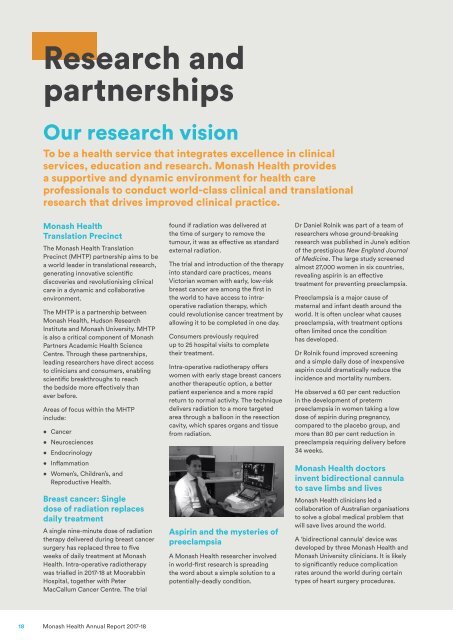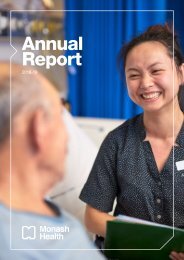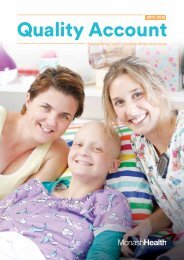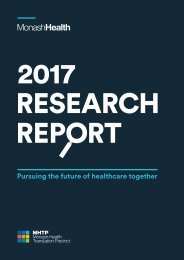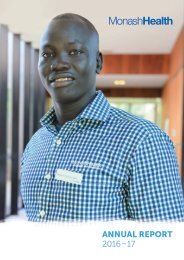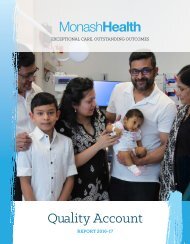Annual Report 2017-18 | Monash Health
You also want an ePaper? Increase the reach of your titles
YUMPU automatically turns print PDFs into web optimized ePapers that Google loves.
Research and<br />
partnerships<br />
Our research vision<br />
To be a health service that integrates excellence in clinical<br />
services, education and research. <strong>Monash</strong> <strong>Health</strong> provides<br />
a supportive and dynamic environment for health care<br />
professionals to conduct world-class clinical and translational<br />
research that drives improved clinical practice.<br />
<strong>Monash</strong> <strong>Health</strong><br />
Translation Precinct<br />
The <strong>Monash</strong> <strong>Health</strong> Translation<br />
Precinct (MHTP) partnership aims to be<br />
a world leader in translational research,<br />
generating innovative scientific<br />
discoveries and revolutionising clinical<br />
care in a dynamic and collaborative<br />
environment.<br />
The MHTP is a partnership between<br />
<strong>Monash</strong> <strong>Health</strong>, Hudson Research<br />
Institute and <strong>Monash</strong> University. MHTP<br />
is also a critical component of <strong>Monash</strong><br />
Partners Academic <strong>Health</strong> Science<br />
Centre. Through these partnerships,<br />
leading researchers have direct access<br />
to clinicians and consumers, enabling<br />
scientific breakthroughs to reach<br />
the bedside more effectively than<br />
ever before.<br />
Areas of focus within the MHTP<br />
include:<br />
• Cancer<br />
• Neurosciences<br />
• Endocrinology<br />
• Inflammation<br />
• Women’s, Children’s, and<br />
Reproductive <strong>Health</strong>.<br />
Breast cancer: Single<br />
dose of radiation replaces<br />
daily treatment<br />
A single nine-minute dose of radiation<br />
therapy delivered during breast cancer<br />
surgery has replaced three to five<br />
weeks of daily treatment at <strong>Monash</strong><br />
<strong>Health</strong>. Intra-operative radiotherapy<br />
was trialled in <strong>2017</strong>-<strong>18</strong> at Moorabbin<br />
Hospital, together with Peter<br />
MacCallum Cancer Centre. The trial<br />
found if radiation was delivered at<br />
the time of surgery to remove the<br />
tumour, it was as effective as standard<br />
external radiation.<br />
The trial and introduction of the therapy<br />
into standard care practices, means<br />
Victorian women with early, low-risk<br />
breast cancer are among the first in<br />
the world to have access to intraoperative<br />
radiation therapy, which<br />
could revolutionise cancer treatment by<br />
allowing it to be completed in one day.<br />
Consumers previously required<br />
up to 25 hospital visits to complete<br />
their treatment.<br />
Intra-operative radiotherapy offers<br />
women with early stage breast cancers<br />
another therapeutic option, a better<br />
patient experience and a more rapid<br />
return to normal activity. The technique<br />
delivers radiation to a more targeted<br />
area through a balloon in the resection<br />
cavity, which spares organs and tissue<br />
from radiation.<br />
Aspirin and the mysteries of<br />
preeclampsia<br />
A <strong>Monash</strong> <strong>Health</strong> researcher involved<br />
in world-first research is spreading<br />
the word about a simple solution to a<br />
potentially-deadly condition.<br />
Dr Daniel Rolnik was part of a team of<br />
researchers whose ground-breaking<br />
research was published in June’s edition<br />
of the prestigious New England Journal<br />
of Medicine. The large study screened<br />
almost 27,000 women in six countries,<br />
revealing aspirin is an effective<br />
treatment for preventing preeclampsia.<br />
Preeclampsia is a major cause of<br />
maternal and infant death around the<br />
world. It is often unclear what causes<br />
preeclampsia, with treatment options<br />
often limited once the condition<br />
has developed.<br />
Dr Rolnik found improved screening<br />
and a simple daily dose of inexpensive<br />
aspirin could dramatically reduce the<br />
incidence and mortality numbers.<br />
He observed a 60 per cent reduction<br />
in the development of preterm<br />
preeclampsia in women taking a low<br />
dose of aspirin during pregnancy,<br />
compared to the placebo group, and<br />
more than 80 per cent reduction in<br />
preeclampsia requiring delivery before<br />
34 weeks.<br />
<strong>Monash</strong> <strong>Health</strong> doctors<br />
invent bidirectional cannula<br />
to save limbs and lives<br />
<strong>Monash</strong> <strong>Health</strong> clinicians led a<br />
collaboration of Australian organisations<br />
to solve a global medical problem that<br />
will save lives around the world.<br />
A ‘bidirectional cannula’ device was<br />
developed by three <strong>Monash</strong> <strong>Health</strong> and<br />
<strong>Monash</strong> University clinicians. It is likely<br />
to significantly reduce complication<br />
rates around the world during certain<br />
types of heart surgery procedures.<br />
<strong>18</strong> <strong>Monash</strong> <strong>Health</strong> <strong>Annual</strong> <strong>Report</strong> <strong>2017</strong>-<strong>18</strong>


